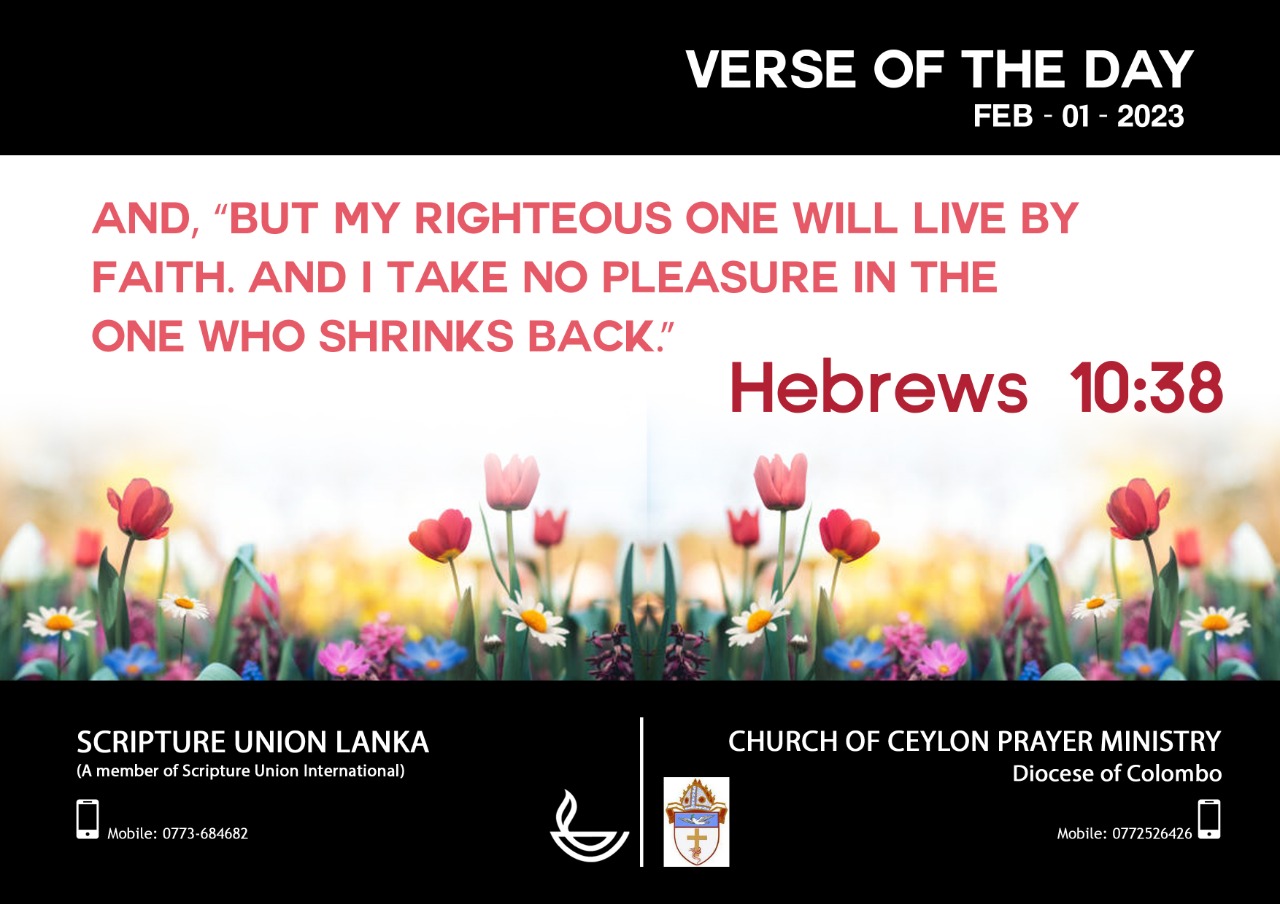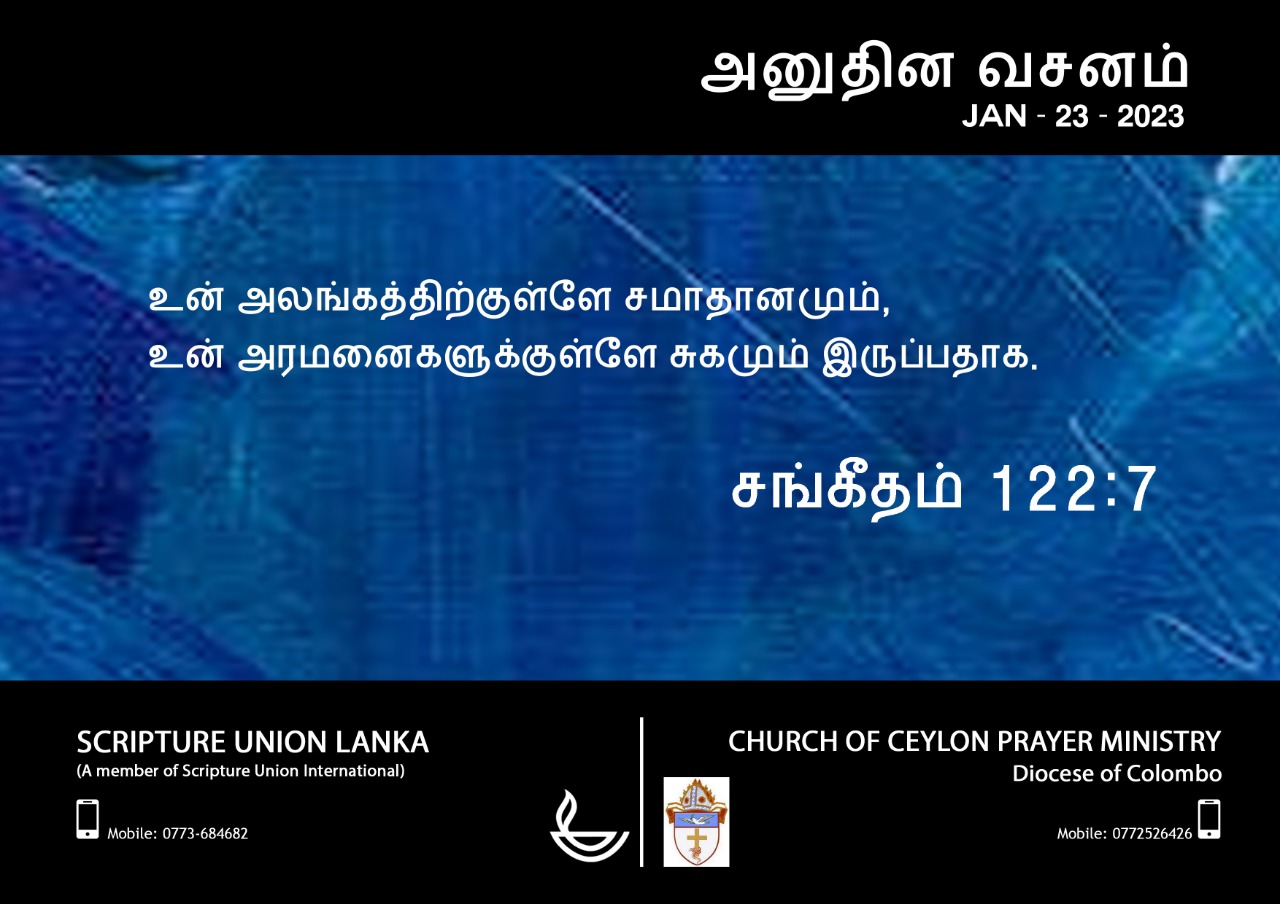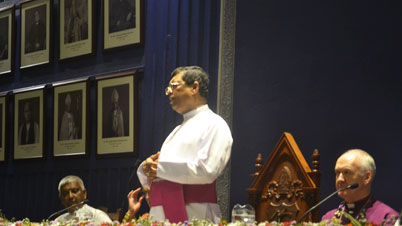
Bishop's Charge - 130th Diocesan Council of the Church of Ceylon DIocese of Colombo
“TAKING CARE OF LIFE IN OUR COMMON HOME"
Year after year when I see all of you gathering here in Colombo from the four corners of this Island nation to attend the Annual Council Session of the Diocese of Colombo, words cannot be expressed how amazed I am, of the tremendous sacrifice each one of you make, to be present here for three days. On behalf of the entire Diocese, let me say "Thank You" for your invaluable presence in our midst....
Year after year when I see all of you gathering here in Colombo from the four corners of this Island nation to attend the Annual Council Session of the Diocese of Colombo, words cannot be expressed how amazed I am, of the tremendous sacrifice each one of you make, to be present here for three days. On behalf of the entire Diocese, let me say "Thank You" for your invaluable presence in our midst.
We have come together, to share life with each other, to take counsel together prayerfully and to place our complete Trust and Confidence in The Lord for our journey forward.
We are holding this Diocesan Council Session this year in the newly refurbished Diocesan Chambers. I am grateful to the family that offered this as a Gift to God and who wishes to remain anonymous.
Today, we have in our midst The Right Reverend Nick Baines - the first Diocesan Bishop of the Diocese of West Yorkshire and the Dales. The three Dioceses of Bradford, Wakefield and our former Link Diocese of Ripon and Leeds were merged in 2014 to create the biggest Diocese in the Church of England. Under this new structure, which now includes the Episcopal area of Huddersfield as well, Bishop Nick exercises leadership for 3 Cathedrals, for 5 Area Bishops, for 5 Archdeacons and for 656 parishes. ( I hope, Bishop, that I got all that right !) I was blessed to participate in the Enthronement Ceremony of Bishop Nick at Ripon and learnt of his life of simplicity and humility when he accorded me his very first official appointment at the Bishop's office. It was there that I extended an Invitation to him to be our Chief Guest at this 130th session of the Diocesan Council, which he gladly accepted. On behalf of all of us in the Diocese of Colombo I extend a very warm welcome to Bishop Nick and his charming wife Linda as they have joined us this evening in our worship and at the inaugural session.
Bishop Nick was born in Liverpool and graduated in modern languages from the University of Bradford. He worked as a linguist in Russia for the British government's communication centre for four years prior to training for ordination at Trinity College, Bristol, where he gained a BA (Hons) in theological studies. He was ordained a deacon in 1987 and a priest one year later. He served in several parishes and in 2000 was appointed as Archdeacon of Lambeth in the Diocese of Southwark and as area Bishop of Croydon in 2003. He was next elected to the see of Bradford and enthroned at Bradford Cathedral in 2011. With the creation of the new diocese of West Yorkshire and Dales in April 2014, Bishop Nick was elected as its first diocesan Bishop as well as the area Bishop of Leeds.
Bishop Nick was a member of the General Synod of the Church of England from 1995 to 2005 and has also worked in the church ministry in adult mental health, children and youth policies and as well as being an experienced religious radio broadcaster. He is the Chair of the Sandford St. Martin's Trust which promotes excellence in religious broadcasting and co-chair of the Meissen Commission which promotes partnership between the Church of England and the Evangelical Church of Germany. Since 2014, he is a member of the House of Lords. He is also the author of six books on the Christian faith. I am also told that he is a keen fan of the Liverpool Football Club and may I wish that club all success in the current English FA season!
Bishop Nick is married to Linda and they have three adult children, 2 boys and a girl as well as 3 grandchildren. Linda is also from near Liverpool and went to Manchester University to study Nursing. She has heldvarious part time nursing roles, and worked as a health visitor for eighteen years, in South London and now in Bradford. She has taught parenting and ante-natal groups and run courses for women with post natal depression.
Linda set out on a new adventure in Art later on and has studied at the prestigious Central St. Martin‟s Art School, learning work in glass and Perspex. She has taken part in exhibitions and taken on commissions, recently making a hospital chapel window in glass.
She combines her busy professional life while continuing to support Bishop Nick in his work, taking Bible study and leading many prayer groups, spending time with teenagers in the church,running a large household and welcoming guests and visitors to their- home.
Bishop Nick and Linda arrived on Sunday the 18th, and since then we have been travelling to Kandy, Killinochchi, Jaffna, Nuwara Eliya and Bandarawela. I am confident that through these visits and interactions,Bishop Nick and Linda would have begun to understand something about the work of our church, our partnership with God in His Mission and about our life in the faith as we attempt to accomplish greater things for God. I hope and believe that Bishop Nick and Linda will come back to visit us again, to dialogue and share more
with our church and the wider community and to experience more of our country.
Thank you Bishop Nick and Linda for your presence. We deeply appreciate having you here with us as we meet to worship, pray, listen, discuss, deliberate and decide on the issues which face us as a faith community. Your presence here helps us firstly to further strengthen our links with the world of the Anglican Communion and in particular with the Diocese of West Yorkshire and the Dales. But it also challenges us and reminds us that even as we go about our own affairs, so must our eyes not lose focus and our hearts not turn away from the life and concerns of the wider „household of God‟ (Ephesians 2:19 22) of which we form part.
Let me also welcome our Ecumenical friends and partners. You have walked with us even as we have walked with you. The Diocese of Colombo extends to you a warm welcome. We have in our midst today.
Our Theme
Pope Francis in his encyclical letter “Laudato Si” refers to the raped, exploited, vandalised environment of this our Common Home and I thought it was fitting to arrive at a similar theme where we would be able to discuss about our life together in the Common Home of our family, the Common Home of our Church and Society and the Common Home of our Environment.
The Common Home of our family
The God in whom you and I believe is a Relational God, a family God, and this God moves and works on the basis of Divine Love. We who are in the process of experiencing Christ need to understand the attributes of this Relational Family God. The Divine Love on which this God functions reveals to us the Divine attribute of Self Giving offering one's utmost, one's fullest to the other. So much so, the Father gave His only begotten Son so that who so believeth in Him should not perish but have everlasting life. The Divine Love on which this God functions reveals unto us the Divine attribute to offer forgiveness unconditionally. Unlimited forgiveness is offered freely. The Divine Love on which this God functions reveals unto us another attribute of the urgency of Reconciliation. That which He accomplished on the Cross is to be continued and established by us. As the Bible puts it, we have been entrusted with the ministry of Reconciliation. Another attribute of this Divine Love is to offer Hope in Christ all the time, whatever our circumstances in life may be. If the Common Home of our Human Family is suffering with the deficiency of these Divine Attributes, then we need to create space for God to come in and to perform that miraculous transformation.
The Common Home of our Community & Church
What is the purpose of the church in today's context? What is expected of our society? In our own situation, I am glad that our diocese was able even in a small way to be instrumental in the awakening we saw in our communities and nation over the past few years. Emerging from indifference, fear and a feeling of helplessness, small groups began to speak out against the injustices that affected the health and the spirituality of this bigger family. The tiny mustard seed grew, the little leaven expanded and the flame of the small candle became firmer shedding more light till the cry „Venasak' or Change emerged from all corners. The result was a demonstration of anger against and a rejection of those who tried to destroy this Common Home, which our shared spirituality affirms must be built on our yearnings for Peace, Justice and Righteousness. We need to create space within this Common Home for the vulnerable, the exploited, the deceived,the marginalized and for those who still cry and yearn for Justice. Space must be created to let their voices be heard loud and clear.
The Common Home of our Environment
I would like to quote the opening paragraphs of the encyclical letter of Pope Francis referred to earlier since it very meaningfully encapsulates on the one hand a fundamental Christian teaching, aspects of which the Church has somewhat neglected and, on the other an audit of humankind's callous treatment of God's wondrous work.
“Laudato si, mil Signore” – “Praise be to you, my Lord”. In the words of this beautiful canticle, Saint Francis of Assisi reminds us that our common home is like a sister with whom we share our life and a beautiful mother who opens her arms to embrace us. “Praise be to you, my Lord, through our Sister, Mother Earth, who sustains and governs us, and who produces various fruit with coloured flowers and herbs”.
This sister now cries out to us because of the harm we have inflicted on her by our irresponsible use and abuse of the goods with which God has endowed her. We have come to see ourselves as her lords and masters, entitled to plunder her at will. The violence present in our hearts, wounded by sin, is also reflected in the symptoms of sickness evident in the soil, in the water, in the air and in all forms of life. This is why the earth herself, burdened and laid waste, is among the most abandoned and maltreated of our poor; she “groans in travail” (Rom 8:22). We have forgotten that we ourselves are dust of the earth (cf. Gen 2:7); our very bodies are made up of her elements, we breathe her air and we receive life and refreshment from her waters. Nothing in this world is indifferent to us”
Our own communion has not lagged behind in this vital area, as the Standing Committee report spells out in detail. The Anglican Communion Environmental Network (ACEN) meeting under the leadership of Archbishop Thabo Makgoba of South Africa stated; “...the Church must recognize the urgent need for action on climate change. From the perspective of our different faiths we see the earth as a beautiful gift. We are all called to care for the earth and have a responsibility to live creatively and sustainably in a world of finite resources...” Archbishop Justin Welby in his own remarks on the ACEN report at the Synod in York said; “...it is a moment at which we sense the current of events running in a new way..... along with the Pope's encyclical, ..... (the work of ) Ecumenical Patriarch (Bartholomew), who has for many years been one of the world's leading experts in this area and continues to work extremely powerfully.... you have the leaders there, of three great communions around the world, all deeply committed.
In our own country, there are many critical environmental issues that we are confronted with, like the Chronic Kidney Disease in 4 of the 9 provinces of our country due to poor quality of water and the presence of heavy metals, de-forestation, encroachments into declared natural reserves and so on...which once again the Standing Committee has referred to, in its report.
There is a challenge here for all of us, our parishes, and diocesan organizations and for each one of us as individuals for continued awareness raising and for a collective action together with other groups within and outside our church and for each one of us, to adopt simpler life styles, as that remains our call. For the motivation and model for Christian living is nothing less than the example of Jesus himself, who, though rich, became poor that through his poverty we might become rich (2 Corinthians 8:9).
The World needs a Father Movement
Two years ago the heads of denominations at a significant meeting and discussion with Rev. Cassie Carsten unanimously concluded that the role of the father in the family was a most crucial issue that churches needed to focus on.
The following year I took part in a training conducted by Cassie at SEDEC with 70 other senior church leaders from most denominations, where the importance of “Fatherhood” in the life of the family, the church and the nation was reemphasized.
To date, formation of „Master Trainers‟ has taken place in many churches and we as an Anglican community have conducted a very successful programme for almost 600 clergy and senior laity in Colombo and Jaffna. Our target is 1000 leaders and trainers within the next 3 years. Cassie is hoping to return for an advanced training for master Trainers next year. His training manual “The World Needs a Father” is being translated into Sinhala and Tamil and regional teams are being set up to facilitate training.
Church of Ceylon Sports Ministry
Sports, like Music is an international language by itself with both the young and old. Sport is also a wonderful way to transmit the values of the Gospel and human values. With this vision in mind the diocese together with the Asian Sports Leadership School, India and with the assistance of the CCYM, the Board of Christian Education, the Mothers‟
Union and Fathers' Guild inaugurated the CCSM programme in April this year. The programme aims to take this message to our parishes and to the community at large, initially through the thirteen Level 2 international trainers who have already been formed. To date, CCSM has worked with about 900 youth in the diocese and the community and it is our intention to have at least one trained person in each of our parish.
Alpha in the Centre and the Regions
The Alpha course was begun in the Cathedral in 2013 and has now completed its fourth session. More than 150 have gone through this 11 week introduction to the Christian faith and about 15 leaders have emerged. They now act as facilitators. Many who have followed the course have found their faith re-vitalized and their commitment and discipleship strengthened. It is important that Alpha is taken to the regions as well, and the course conducted in Sinhala and Tamil. A start has been made in the urban churches of St. Paul's, Milagiriya and Christ Church, Dehiwela but we need to move out of the Colombo region.
Pre Schools & Day Care Centres
There are 46 Pre-schools and Day Care Centres currently being run by various parishes of our diocese. With increased state involvement in this area and a move towards prescribing standards, the need for the involvement of the diocese in this important area was felt. In January this year I appointed a Diocesan Coordinator to visit, evaluate and report on our present activities, so that a structured cohesive development plan with minimum standards could be drawn up for our pre-schools in consultation with the Deaneries, concerned parishes and personnel. The coordinator has by now visited most preschools and we will move on next to the formulation of our strategies.
We are concerned that children receive their early education in safe environments with safe infrastructure. We will launch a programme to upgrade the qualifications and teaching skills of our Pre-school teachers, if they do not match the expected standards that the State requires. We will also ensure that all pre-schools have educational toys, prescribed tools and all other requirements for the teachers to deliver quality education to our expectations so that the children will be blessed and benefitted.
We will look into the possibilities of ensuring that every school has correct toilet facilities and water supply, very specially in rural areas. Constant monitoring will be done to ensure that our Pre-schools and Day Care Centres improve on the quality of their services. We also need to work towards standardizing the remuneration of teachers as they deserve to be paid an acceptable and reasonable salary.
There are many requests from parents in the former war torn areas who are daily wage earners to set up new Day Care Centres run by the church, where the poorest of the poor could leave their children in safe custody, while they do their day's work. Project proposals are to be prepared and help from the world-wide church, the Anglican Communion and Mission Agencies will be sought to meet our needs.
Our Ecumenical Relationships
We as a church are called to manifest the signs of the one body of Christ. This requires that we constantly strive to find meaningful expressions of ecumenical witness, transcending our denominational barriers. We thank God for enabling us to significantly progress in this important area of Christian witness. The Churches belonging to the National Christian Council have formulated a detailed plan of action, to give visible and concrete expression at the congregational level to this our common calling.
The plan includes exchanges
of pulpits, joint Pentecost celebrations, joint ministries among youth, children & women in selected areas, exchange of clergy, joint ecumenical baptism and confirmation service s, joint clergy retreats, common ecumenical hymnals etc.
We have been able to foster greater dialogue and mutual understanding with many Churches outside the NCCSL as well, which has led to the creation of a common platform „The Sri Lanka Christian Fellowship‟ in which many churches have committed to covenant, on principles similar to our code of ethics for mission. We urge all our churches to strengthen ecumenical relationships, especially i n the areas of prayer, worship, fellowship & sacraments so that we may collectively fulfill the high priestly prayer of our Lord Jesus Christ „That all may be one‟ (Jn 17:24).
Our Commitment towards the Confederating Churches
The confederated churches are in constant dialogue exploring serious & difficult areas of our common calling. We are grappling with fundamental core issues such as mutual recognition of the ministries and joint ordination. This is not an easy task. But we are united in continuing this difficult dialogue while recognising that there are more things that unite us than those which separate us. We dare to hope that Christians in Sri Lanka will one day be seen as „one Church', the Body of Christ.
Our Relations with the World- Wide Anglican Communion
The Anglican Communion has 85 million members worldwide in some 165 countries. It has 38 provinces and 6 extra provincial churches and dioceses of which the Church of Ceylon is also one. Being a part of this Communion brings with it privileges as well as certain obligations. It opens us to the vastly rich and varied cultures, histories, traditions, experiences, learning, liturgies, worship and music, of this large family. It brings opportunities to meet, to hold dialogue and share with and learn from people from vastly different backgrounds as many of our clergy and lay people will testify. In fact Bishop Nick Baines' and Linda's presence with us today is a reminder to us of this wider Communion. This greatly reinforces our understanding of our common humanity under God, the Father of us all, but also casts on us a duty for concern, care and responsibility for our sisters and brothers in the wider church. This is so essential to help us break out of the insularity that immerses in our own affairs that bring us over time to widen the horizons of our thinking, understanding andmission.
Church and Nation
Many significant changes have taken place in the country since I last addressed you and looking back at the situation that existed then, there is a sense of amazement at the rapidity of events. The increased freedom and space for dissent and the virtual collapse of the campaign against minority groups are some of the more positive aspects of these changes. We convey the good wishes and prayers of our Diocese to our new President, Prime Minister, Government, and Parliament as they begin work to keep the promises made to the people under the new experimental system of a “National Government” – an effort to break away from the traditional adversarial politics of „the winner takes all'. Although we cannot be happy with certain decisions of the new regime which appear to be contrary to the pledges made and to the yearning of the majority of our people for truth, honesty, justice and decency in public life, still, positive advances have been made and it is important that these are consolidated within the structure of governance.
Our task has not ended. Let us be alive to the need for vigilance to safeguard the progress achieved and to press on in our struggle for the realization of the values of God's kingdom.
As a nation we are a part of the United Nations and we arebound by our international obligations. We do not have either the political or economic clout to defy the world and to tread our own erratic way indefinitely, either in the way we handle and resolve our internal conflicts or in the way in which we interact with the world. This lesson has been learnt the hard way. 65 years after independence we are yet struggling to rise above the morass of ethnic and religious tribalism. We cannot put off for much longer a resolution to our very long ethnic issue, a solution which must be just, fair and acceptable by all communities who call this Island nation “home”. Thisis the foundation of peace on which development, economic prosperity, political and social justice can be built.
A related matter that requires urgent attention is that concerning the „disappearances‟ of persons in the North and East and in the rest of the country. The figure quoted of such cases since the 1980s is a staggering 80,000. This is heartbreaking and an intolerable situation for the loved ones of those missing and a huge indictment on our claim to be a civilized society. I urge the Government to urgently and honestly address this issue, to see that justice in all aspects is done to the victims and their families and to bring an end to the pending cases as immediately as possible.
Another issue of great concern is the alarming increase in child molestation and abuse. Our children are increasingly becoming subject to sexual harassment, exploitation and intimidation. Very strangely, the perpetrators go scot free in many cases. I urge the government to adopt a proper mechanism to immediately deal with those involved in child abuse and further provide adequate security and protection to all the children of Sri Lanka. The Kingdom of God belongs to children and it is our bounden duty to protect them.
As I write this address, the United Nations Human Rights Council has issued its postponed report on Sri Lanka while the US led draft resolution has been tabled at the 30th session of the UN Human Rights Council with the apparent concurrence of the government of Sri Lanka.
There are many issues concerning the alleged serious infringement of the rights of citizens of this country by both parties to the armed conflict that ended in 2009, raised in the UNHRC Report. The resolution calls on Sri Lanka to take a series of steps to investigate gross violations of human rights, reform and strengthen domestic laws to prevent future recurrence and to move towards the devolution of authority and the effective implementation of the 13th amendment. While a few have raised their voices about how the passing of this resolution will infringe on our sovereignty and even bring about direct external interference, what is often forgotten is the fact that our rulers have a constitutional and moral duty and obligation to protect the lives of civilians and are accountable and answerable to the nation for all violations of human rights. Unfortunately, successive governments in the recent past have not honoured these commitments and it is this failure to address issues seriously that has paved the ways for external pressures. In the words of the LRRC report: “Sri Lanka therefore has constitutional and international obligation for the effective national implementation of these core conventions both during times of peace and war, and in the latter situation, together with applicable International Humanitarian Law. The protection of human rights of civilians in situations of armed conflict has gained increasing recognition in recent Humanitarian La Hundreds of persons who appeared before the Commission clearly articulated the critical importance of re-dedicating ourselves to the task of promoting and protecting human rights as a catalyst for bringing about reconciliation lasting peace and security. The Commission also notes that the concept of human rights is not an ideal that is alien to the socio-cultural ethos of Sri Lanka or one that belonged to a particular part of the world, Western or other, but one deeply embedded in the core values and ethics espoused by Buddhism and other religions practiced in Sri Lanka.
............ During the public sittings and its field visits to conflict affected areas, a large number of representations were made before the Commission alleging the violation of fundamental rights and freedoms of people affected by the conflict. These include abductions, enforced or involuntary disappearances, arbitrary detention, conscription of underage children, extrajudicial, summary or arbitrary executions, violation of the freedom of expression, movement, association, freedom of religion and the independence of the media etc.
Representations were also made on issues pertaining to the rights of IDPs, and other vulnerable groups such as women, children and the disabled. The Commission considers that its recommendations on these human rights issues are critically relevant to the process of reconciliation”.
Religious Freedom
As I have noted in the previous section, with the political changes that took place early this year, the overt intimidation and violence against certain minority religious groups have ceased. When taken together with the total rejection of extremist parties and groups at the polls, it is quite clear that the violent events referred to, far from being caused by popular feelings or movements were instigated and led by persons who had at least the tacit toleration if not support of the authorities.
Religious peace and amity however cannot be taken for granted and it is our calling as Christians to continue to be in genuine dialogue with each other and with those of other faiths, to build bridges of respect and understanding so that grievances and misunderstandings do not escalate into hostility and violence.
Healing of Memories Programme (HOM)
We live in a society where bitter and hurtful memories pervade the minds of many, further aggravated by the scars of violence and war that we as a nation have experienced for more than three decades. Such bitter memories nourish feelings of suspicion, fear, hatred and revenge, among all sections of our people. The“Healing of Memories programme” which commenced in December 2013 and has now completed the 1st phase of implementation, is aimed at bringing healing to those with bitter memories of the past. It strives to transform people so that they may be better equipped to be agents of justice, and work towards accountability building peace and reconciliation in a constructive manner.
We are happy that this important and relevant ministry is implemented jointly with the National Christian Council of Sri Lanka on behalf of all its constituent members, a new model of forging ecumenical witness.
The program is conducted under the terms of an MOU between the Healing of Memories Institute in South Africa, which is located at St. Margaret‟s Convent, Colombo, the Anglican Church and the NCC.
Our Challenges in Mission
The greatest challenge today within the Common Home or the Household of God is as to how we live and take care of each other, even with our deepest differences. Our own
Metropolitan and Archbishop of Canterbury – Justin Welby has this to say; "It is a fundamental challenge of our time not only for the world but also for the church of God. If as a body of Christ we can work out a way of disagreeing without dividing, then we will have much to offer the world. Conversation together cannot be purely a matter of institutional allegiance, it must be found in our mutual commitment to one another in Christ. Conversation together is not a diversion or a delaying tactic, nor is it an outcome. It is a path to understanding, a way of walking together in faith today in the here and now. A process of this nature comes with a cost. Entering conversations on areas of deep disagreement is not safe for anyone. There is risk and vulnerability. A safe space is one where this cost is recognised, the space is entered into in trust and used respectfully by all parties. Diversity and difference cannot be wished away, even when their breadth makes us uncomfortable and at times unsafe. Hence we need to create space within this Common Home or the Household of God for the vulnerable, the exploited, the deceived the marginalised and for those who still cry for Justice. Space must be created to let their voices be heard loud and clear and opportunities for inner transformation of hearts and minds to take place
Through all our differences, we belong to one another: not through our choice, but God's. Those who follow Christ are relatives - we are related through our Shepherd. You may choose your friends, but you are stuck with your relatives. You do not chuck out members of the family: you love them and seek their wellbeing even when you argue. Good and loving disagreement is a potential gift to a world of bitter and divisive conflict".
Let us, who are called the „People of God‟ enter that space of conversation in “compassion, kindness, humility, gentleness and patience....and in tolerance” (Colossians: 3:12) to rebuild, renew and strengthen our relationships within our families, within our dioceses and church, with our sister churches and with the wider Church of Christ in this country. It is only then can we be honest and true builders of Peace and Reconciliation within our society and nation.
Board of Social Responsibility
The decentralized Regional BSRs have been carrying out their programme of work with needy communities over the last two years in areas such as disaster relief, livelihood support for deprived families, educational support for children, awareness building on safe internet, environment, HIV AIDS , as well as medical assistance to those in need. The Disaster Management program of the Diocese of Colombo, piloted by the Centre BSR continues. After the completion of the initial comprehensive training program for the clergy and laity in 2013 those trained undertook the training of 21 clergy and laity with a view to forming trained teams in the regions. The BSR will move forward with this capacity building training so as to build a Church and communities trained in preventive action. Further, the Diocesan Disaster Management Core Resource Group, on the invitation of the NCC will soon launch a training programme for our ecumenical partners as well.
Evangelism & Discipleship Course for newly ordained Clergy and the Confirmed
The proclamation of the “Good News” is the charge that Jesus laid before his disciples. “Go into the world and make
disciples of all men ” This is the imperative that is before us for all times. The challenge for each generation in their own time and their own place is to discern how best to communicate the Good News of the Cross and the Empty Tomb. It is in this perspective that I have asked the Diocesan Mission Council to reflect and draw up an action plan on how they could assist in the task of further equipping newly ordained clergy in the twin areas of evangelism and discipleship.
Retirement of Archdeacon of Galle and appointment of a new Archdeacon
Ven. Dr. Rienzie Perera, retires as the Archdeacon of Galle after having completed his term. Fr. Rienzie has given leadership to the churches in the South for the past 3 years, juggling his time between his work in the southern province and his varied commitments at the diocese in Colombo, where he continued to serve inseveral Boards and Commissions such as the CIEF, BoM and the Asian Theological Academy which he was mainly instrumental in setting up. Fr. Rienzie combines deep Biblical understanding, rigorous intellectual discipline, with administrative and leadership skills.
As he takes on his new responsibilities in the Church, I convey my gratitude and that of the diocese to Fr.Rienzie and to his wife Shirlene for their contribution in consolidating and strengthening our work in the South during this period.
In consultation with the Standing Committee, I have appointed Fr. Sunil Ferdinado as the new Archdeacon of Galle. He takes up his post in January 2016. Fr. Sunil was ordained in 1983 having completed his BTh Serampore degree and thereafter has served in parishes both in rural and urban areas. He later obtained a Master‟s Degree from Trinity Theological College, Singapore.
Fr. Sunil served as Chaplain, St. Thomas' College Mount Lavinia and also as Area Dean. I wish Fr. Sunil and his wife Aruni God's blessings and close presence as they take on this heavy new responsibility.
New Appointments
The Theological College of Lanka, Pilimattalawa is one of the most important ecumenical institutions of the church and a visible symbol of our unity. Rev. Dr. Jayasiri Peiris, a very senior priest of our Diocese took over as the Principal of the College in April 2015 and his official induction took place on College Day – 10th July 2015. As Fr. Jayasiri and his team get down to their task, there are many challenges. We assure him and Geethamali of our prayers and support.
Mr. Chanaka de Silva was appointed as the new Registrar of the diocese following the demise of Ms.Sriyanganie Fernando. Chanaka has been closely involved in the work of the diocese for many years, alsoserving as a member of the Standing Committee and the Incorporated Trustees. He has a very busy practice as a founding partner of his own law firm and we are therefore much grateful to him for taking on this added responsibility. I assure Chanaka, his wife Nilmini and their children of my prayers and those of our Church.
Consecration and Re-Dedication of Churches
As mentioned in my charge last year, the re-dedication of All Saints Church, Pettah and the consecration of the new church of St. Barnabas, Avissawella took place after the last Council sessions. In my capacity as Vicar General of Kurunegala and Presiding Bishop of Church of Ceylon, it was a happy occasion when we re-consecrated the Chapelat Hillwood College, Kandy in May this year.
Obituaries
It is with deep sadness that I record the deaths of the following during the year under review.
Sr. Jane Margaret, Prof. J.N.OleapFernando, Ms. Sriyanganie Fernando and Mrs. G.E.S. Chelliah
We remember with love and thanksgiving the contribution each one of them made to the Church and to the wider community. May God‟s comforting presence be with the members of their families and all their loved ones. May their soul rest in peace with God.
My Thanks
I thank my God who has called me to handle this great responsibility with its varied challenges. In the challenges which I was confronted with, very specially those relating to the Diocese of Kurunagala and Trinity College, God has been so merciful to us to the extent that many a difficulty has been resolved by Him. The dark clouds that were hovering over our heads have moved away and we are able to see the rays of the sun, so to say, shining on us once again.
I thank the Archdeacons who stood by me through good times as well as when the going became rough and tough. I thank the CEO and Secretary of the Diocese, Mr.Arun Gamalathge, the Executive staff and Leadership Team of the Diocesan Office and the entire body of staff for their unstinted support at all times.
Mrs. Ruth Wijesinghe, my Personal Assistant and PA to several Bishops before me, retired very recently after 23 years of faithful and devoted service to the diocese. Her expertise especially in Sinhala translations and correspondence was greatly valued. I wish her contentment and fulfillment in her retirement. I will fail in my duty if I do not thank the Administrative Secretary to the Bishop Mrs.Jeevanam Watson, secretaries and other staff working in the Bishop's office for their dedication and commitment to make life easier for me. I thank my Driver and all other support staff members for all that they mean to me.
I am grateful once again to Fr. Sam Ponniah and his team for the Council's Worship Resource book. To Frs.Jayanath Panditharatne and Stephen Arulampalam for the translations of the Bishop's Charge, to Rev.Keerthisiri Fernando who prepared the Bible studies and for the clergy who led the Bible studies in the three languages. My thanks also go out to Rev. Ranadeva Dias and Rev. S. Sureshkumar for helping me in the reading of the Charge in Sinhala and Tamil as well as to Rev. Nesita Padmasiri and Rev. Dorris Virtue who are my chaplains at this year's Council sessions.
I am eternally grateful to God for giving me a very understanding and supportive family in Harshini and my children Dhiluckshini & Johan, Dhiranjan & Koshala for joining me in our Pilgrimage to serve our Lord who called us as a family to live for Him till our very last day here on earth.
I thank God for the anonymous donor who very generously helps me each year with funds for repairs to churches and vicarages. The following are the contributions received in this respect from October last year to October 2015:
|
St. Mary Magdalene Amparai – Vicarage |
Rs. 152,920.00 |
|
Church of the Resurrection, Molkawa |
Rs. 227,000.00 |
|
All Saints, Galle –Vicarage and Buona Vista |
Rs. 90,400.00 |
|
St. Francis Boys' Home, Minuwangoda - Study Hall |
Rs. 331,350.00 |
|
Union Church, Welisara |
Rs. 200,000.00 |
|
St. Luke's Church, Sarrikarrimula - Sexton's quarters |
Rs.432,934.00 |
|
St. Mary's Church, Veyangoda |
Rs. 282,792.00 |
|
Cathedral, Mission House |
Rs. 1,500,000.00 |
|
St. Barnabas' Church, Avissavella |
Rs.2,129,897.99 |
|
Church of the Holy Spirit - Vavuniya –Vicarage (Work yet to get underway) |
Rs. 61,660.00 |
|
Niyagama Church and Vicarage |
Rs. 2,351,898.38 |
|
Denipitiya Medical Mission, Chapel |
Rs. 1,202,300.00 |
|
Marawila Church |
Rs.2,000,000.00 |
|
Total: |
Rs.10, 963.153.37 |
With thanksgiving and praise to our Pilgrim God who travels with us in our life‟s journey; to Him be Praise and Glory forever and ever. Amen.
Thank you for your patient listening and may God Bless each one of you.

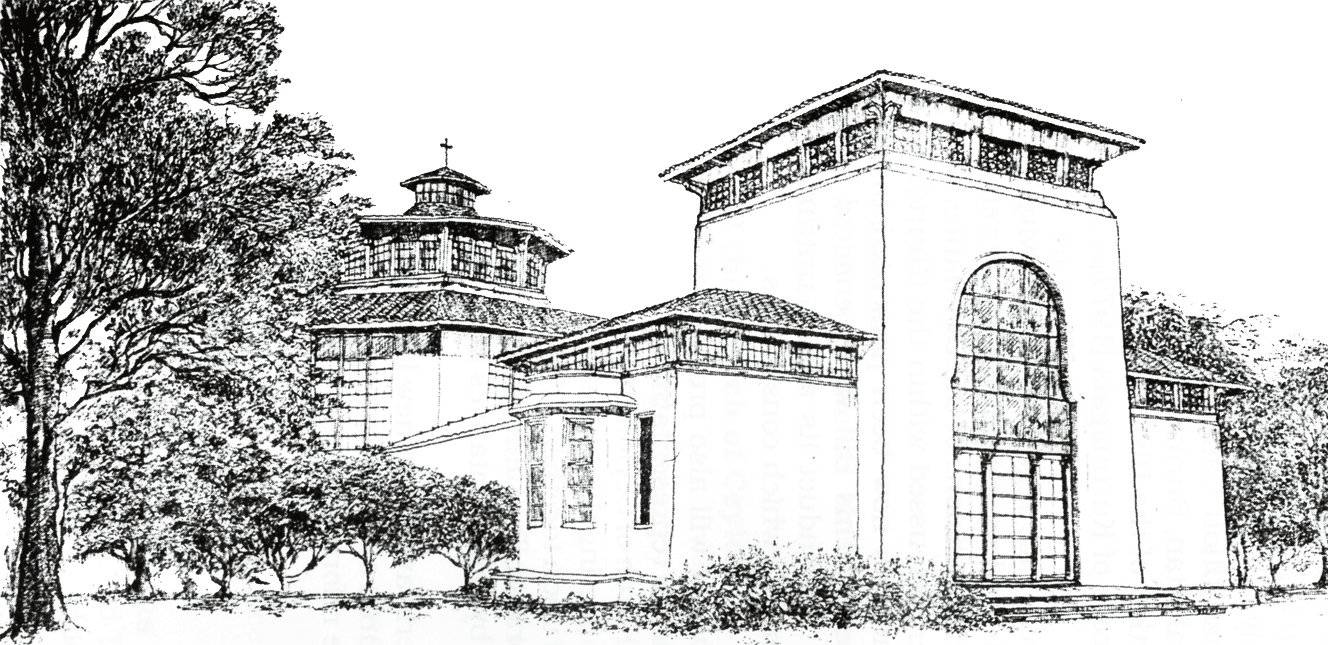

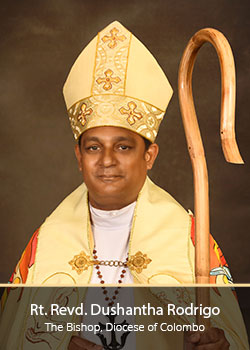

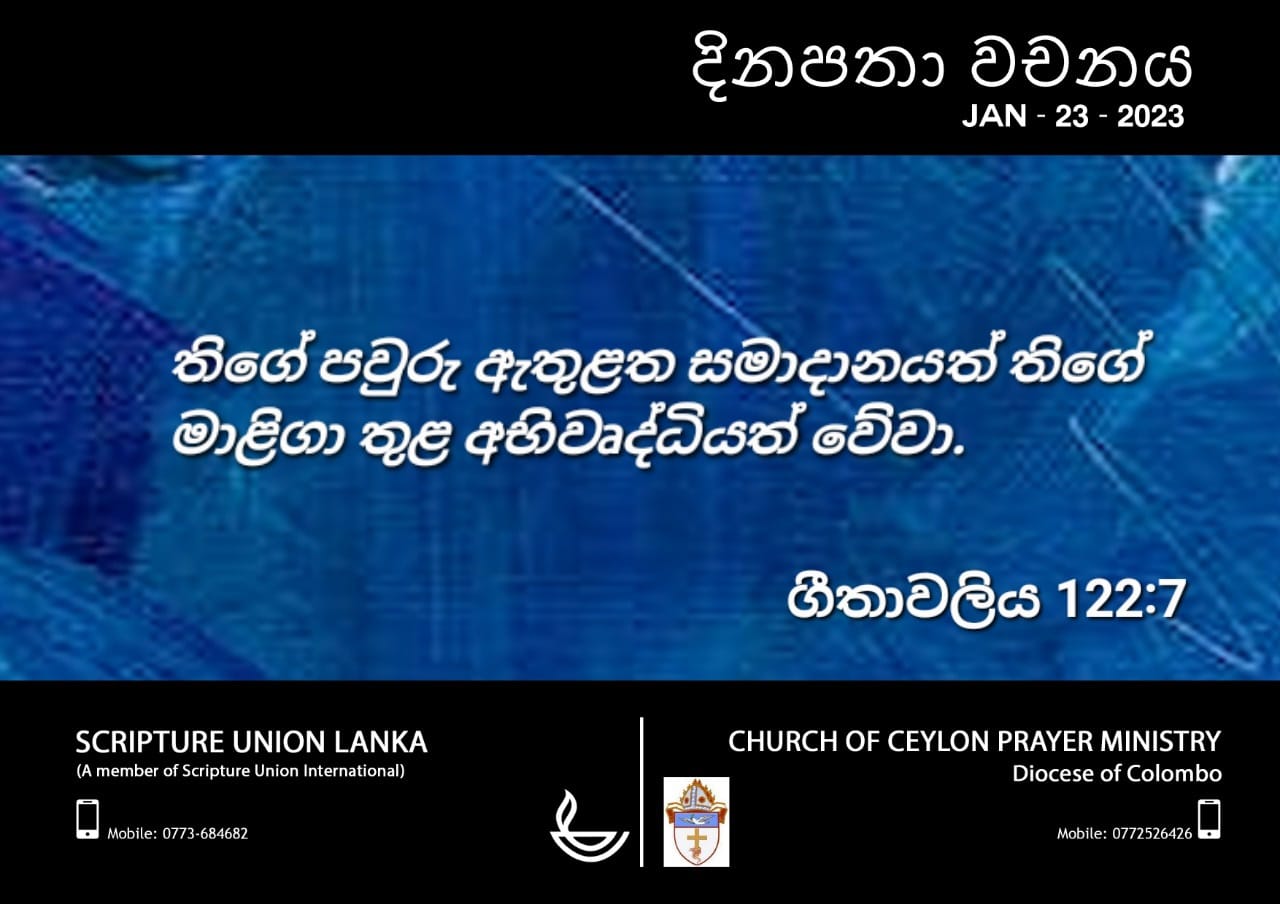
.jpeg)
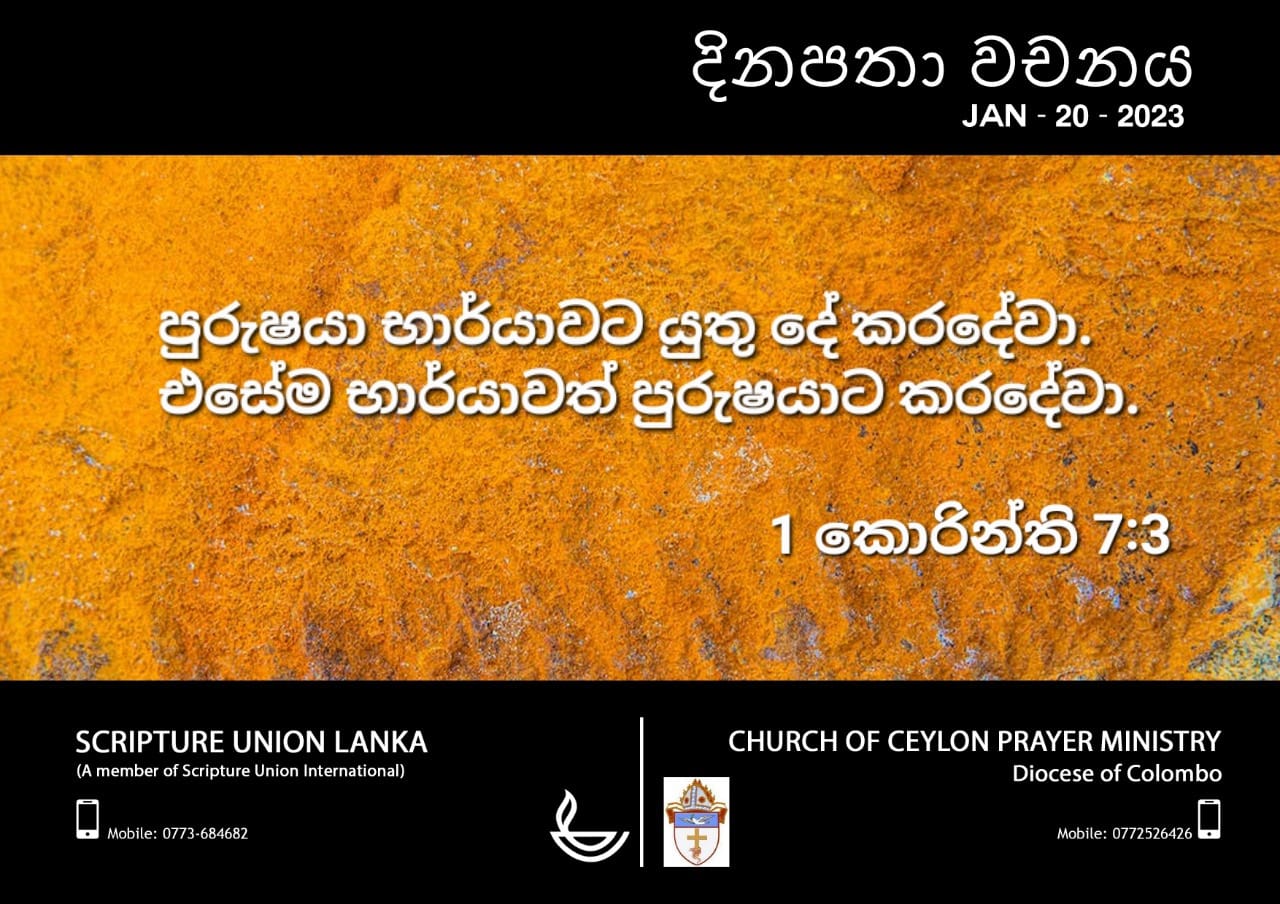
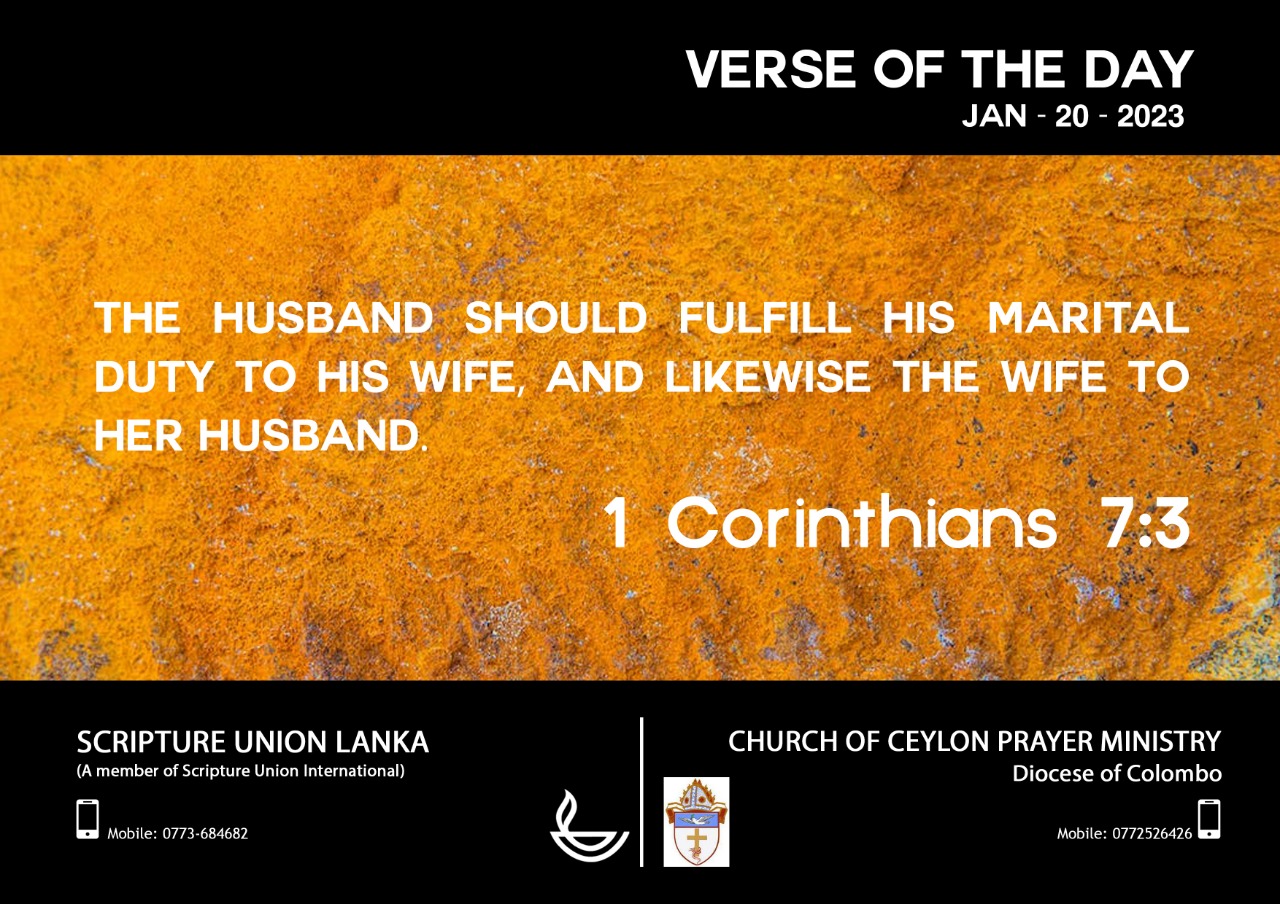
.jpeg)
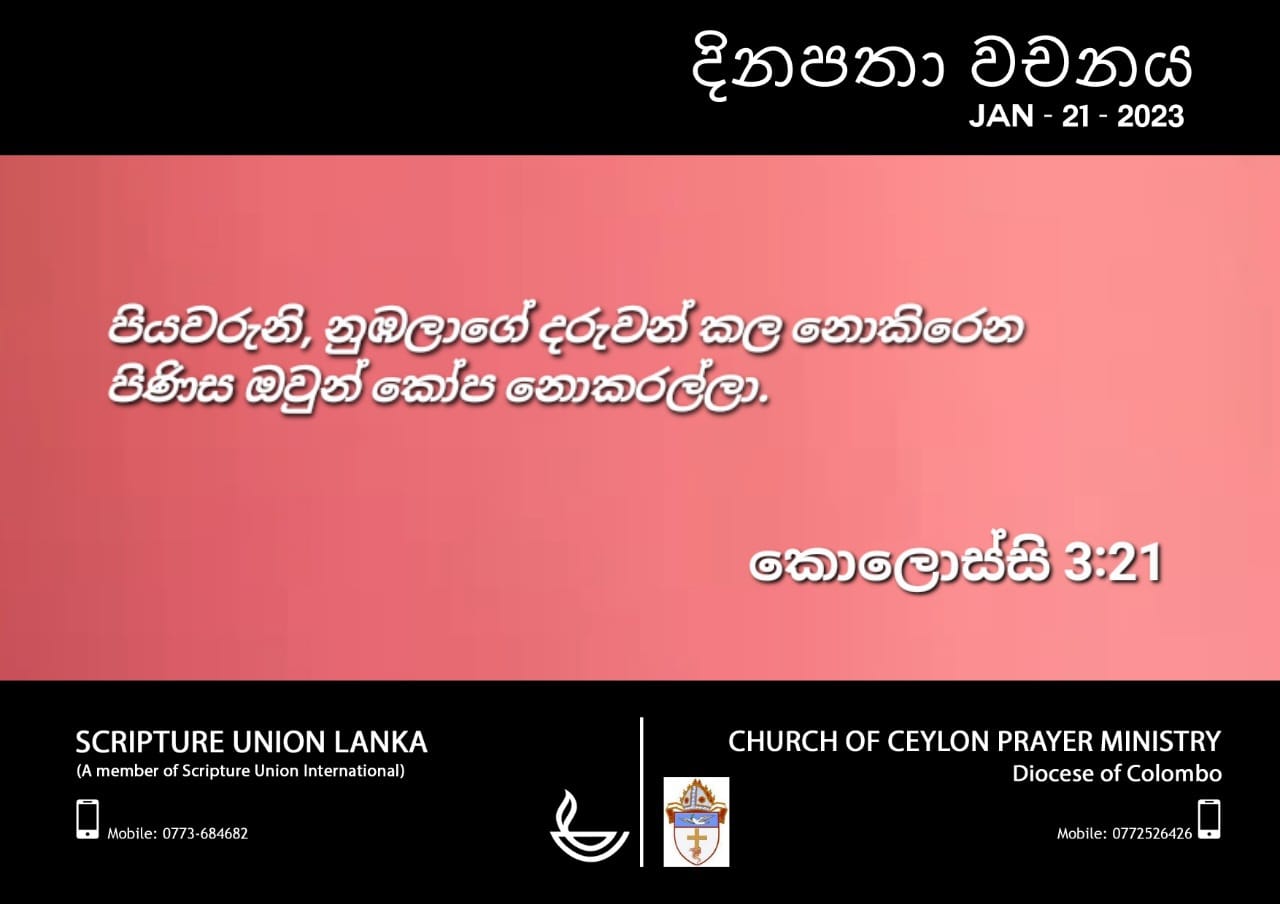
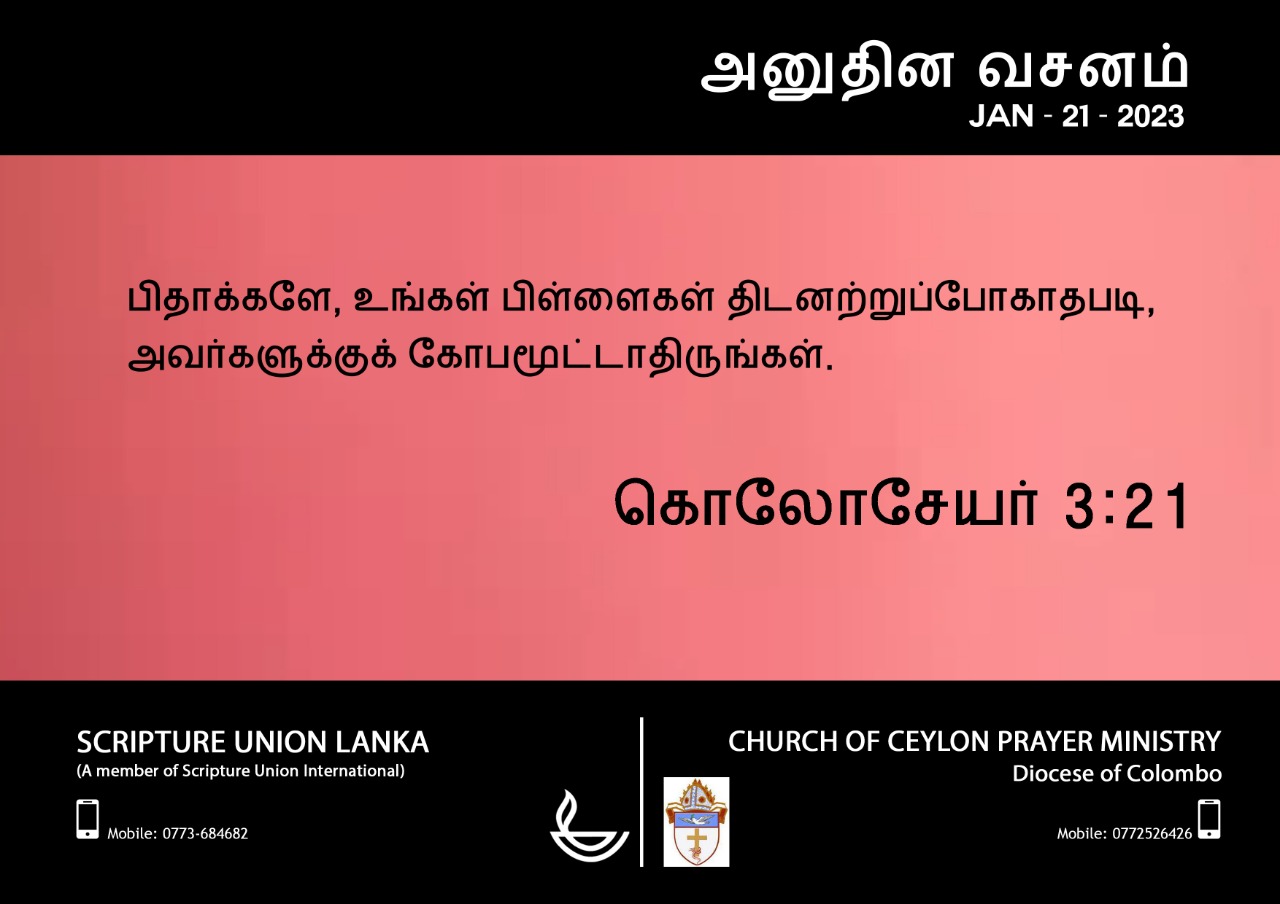
.jpeg)
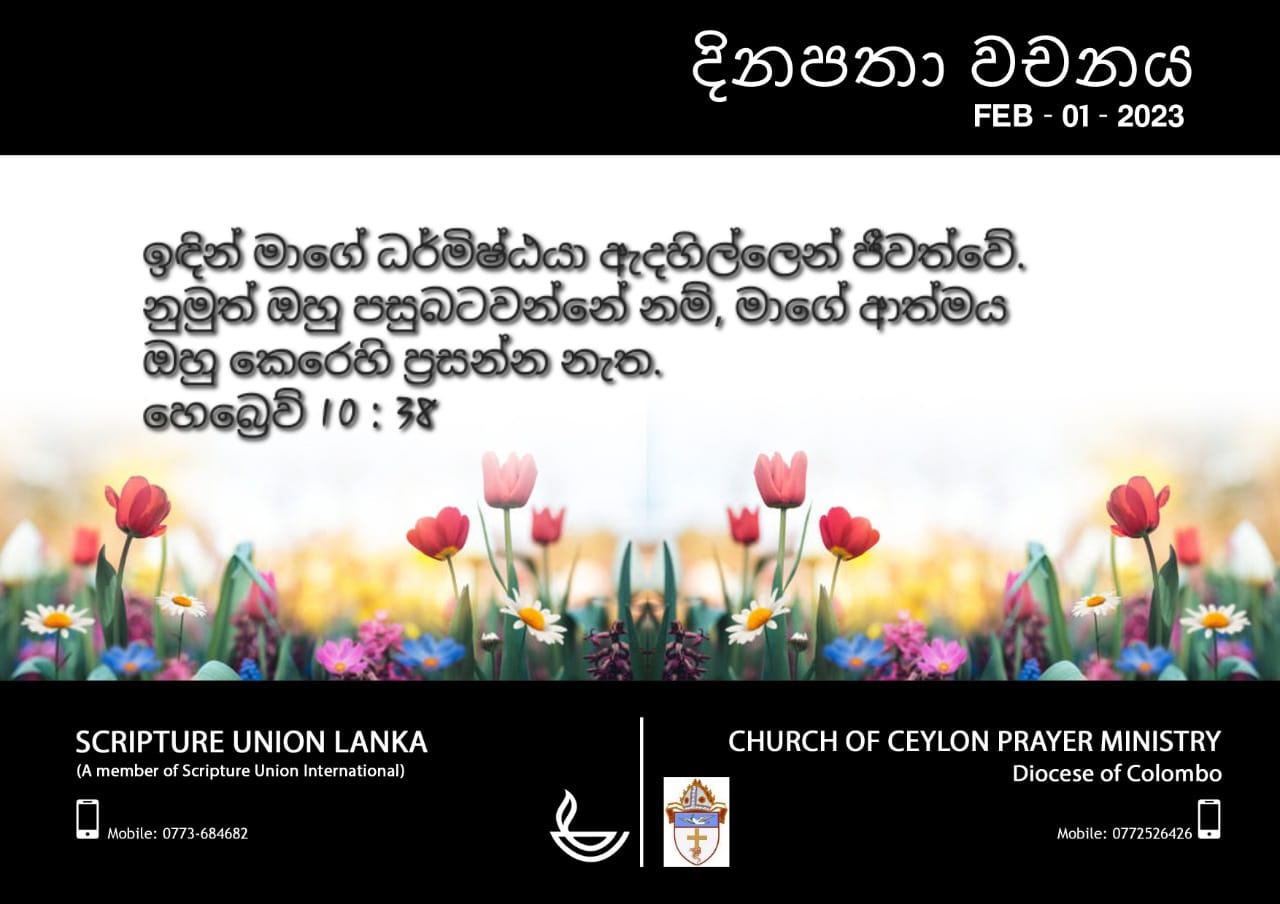
.jpeg)
